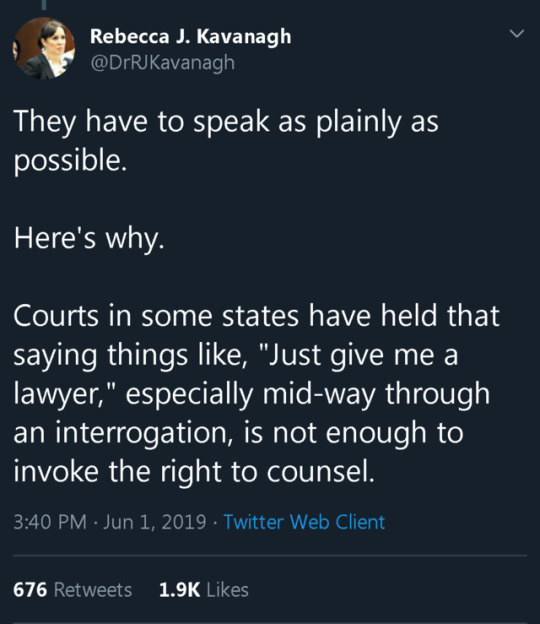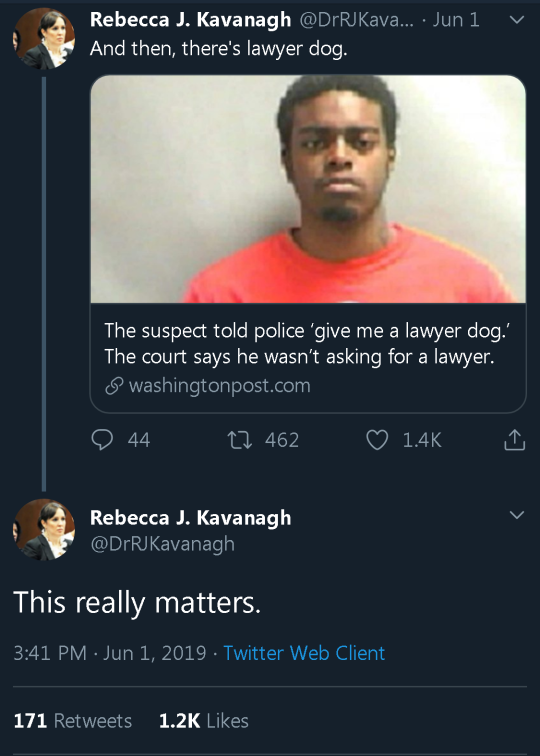Note
when you say “positive / negative right”, what do those mean?
thanks for the good posts :)
a negative right is a claim to protection from some sort of interference; a positive right is a claim that the other party has an obligation to act in some way beyond just refraining from causing harm. for example, the right to free speech is generally spoken about as a negative right: it guarantees me the freedom from state intervention into what i can say. a right to health, on the other hand, would be a positive claim that i should be guaranteed access to things like clean air and water, health care, sick leave, &c.
in practice this distinction is actually much messier than i'm making it sound, and most 'negative rights' are basically meaningless without positive interventions, except in the fantasyland of libertarian political discourse. for example, the united states prohibits one human being from enslaving another (a negative right to legal and bodily freedom) but simultaneously engages in, and permits, incarceration with & without forced and un(der)-compensated labour requirements. the state is not actually granting freedom, and slavery has only been outlawed on a very limited and technical basis. another example is the right to abortion, which, prior to the dobbs decision, was legal in the us on the basis of a 'right to privacy' as established in roe v wade—a freedom from specific interventions in one's medical decisions. however, for decades the actual right to abortion was eroded by the us's lack of universal health care and paid time off, and by laws that became progressively more restrictive in terms of when in a pregnancy abortions were allowed, what clinics had to do in order to be allowed to operate, and what requirements patients had to satisfy first (waiting periods, ultrasounds, &c). in practice this meant that fewer and fewer people could actually access abortion, despite having, technically, legal protection from government interference in its provision. even freedom of speech falls apart as a purely negative right, because, as i've said before, most enforcement of speech limitations actually happens via economic mechanisms like the threat of losing your job—meaning, the operative issue here is not usually whether the state can directly censor me but whether i risk starving to death if a corporation disliked what i said. in other words, what makes my speech vulnerable is the fact that i live in a society that does not guarantee me food, shelter, and basic necessities as positive rights.
negative rights appeal to liberals and other reactionaries because they're framed as maximising everybody's freedom: your actions are only constrained if they risk impinging on me. however, in actuality what this means is that a right defended on 'negative' grounds is basically incapable of redressing existing social and political inequities, and instead upholds or even exacerbates the power dynamics already in effect. i am actually not a huge fan of 'rights' as a legal framework period, and i think a well-defended 'positive right' is really moving beyond the construal of 'rights' and into a more materialist and socially contextualist framework, but that's a different post.
428 notes
·
View notes
Text
An incomplete list of things that employers commonly threaten that are 100% illegal in the United States
"We'll fire you if you tell others how much you're making" The National Labor Relations Act of 1935 specifically protects employees who discuss their own wages with each other (you can't reveal someone else's wages if you were given that information in the course of work, but you can always discuss your own or any that were revealed to you outside of work duties)
"If we can't fire you for [discussing wages/seeking reasonable accommodation/filing a discrimination complaint/etc], we'll just fire you for something else the next day." This is called pretextual termination, and it offers your employer almost no protection; if you are terminated shortly after taking a protected action such as wage discussion, complaints to regulatory agencies, or seeking a reasonable accommodation, you can force the burden onto your employer to prove that the termination wasn't retaliatory.
"Disparaging the company on social media is grounds for termination" Your right to discuss workplace conditions, compensation, and collective action carries over to online spaces, even public ones. If your employer says you aren't allowed to disparage the company online or discuss it at all, their social media policy is illegal. However, they can forbid releasing information that they're obligated to keep confidential such as personnel records, business plans, and customer information, so exercise care.
"If you unionize, we'll just shut this branch down and lay everyone off" Threatening to take action against a group that unionizes is illegal, full stop. If a company were to actually shut down a branch for unionizing, they would be fined very heavily by the NLRB and be opening themselves up to a class-action lawsuit by the former employees.
"We can have any rule we want, it's only illegal if we actually enforce it" Any workplace policy or rule that has a "chilling effect" on employees' willingness to exercise their rights is illegal, even if the employer never follows through on any of their threats.
"If you [protected action], we'll make sure you never work in this industry/city/etc again." Blacklisting of any kind is illegal in half the states in the US, and deliberately sabotaging someone's job search in retaliation for a protected action is illegal everywhere in the US.
"Step out of line and you can kiss your retirement fund/last paycheck goodbye." Your employer can never refuse to give you your paycheck, even if you've been fired. Nor can they keep money that you invested in a retirement savings account, and they can only claw back the money they invested in the retirement account under very specific circumstances.
"We'll deny that you ever worked here" not actually possible unless they haven't been paying their share of employment taxes or forwarding your withheld tax to the government (in which case they're guilty of far more serious crimes, and you might stand to gain something by turning them in to the IRS.) The records of your employment exist in state and federal tax data, and short of a heist that would put Oceans 11 to shame, there's nothing they can do about that.
94K notes
·
View notes
Text
“They’re trying to discharge her constructively. Do you know what Constructive Discharge means?” She asked.
As soon as I heard the term ‘Constructive Discharge,’ I knew I’d never seen it on a vocabulary quiz.
“No. What does it mean?” I asked.
She explained.
“Constructive discharge is a fancy way of saying “being forced out.” It’s not good. And if you’re not a lawyer or in human resources, you’ll probably learn what it means when it’s happening to you.”
“Oh my God. I’ve seen this my entire career and never knew it even had a name.” I thought.
You’ve seen constructive Discharge too. You may have experienced it. We’ve all made choices to avoid it.
Constructive discharge defined
“We can’t fire you, but we’ll make you so miserable you’ll quit, and then we won’t have to pay your unemployment.”
Then there’s the textbook definition:
“A constructive discharge occurs when your employer has made working conditions unbearable, forcing you to resign.”
Or as one person put it.
“I didn’t get handed a pink slip, but when you’re not wanted, people have a way of letting you know.”
HR isn’t always the secret police.
Employees aren’t always victims of evil-doers.
However, employers push employees out all the time to maintain and protect the, “We didn’t do anything wrong, YOU did,” power structure.
Constructive Discharge looks like this:
— Meeting invitations slow to a trickle, and you’re excluded from emails and generally looped out of what’s going on.
— People stop talking to you or stop talking when you walk in.
— Your emails don’t get answers, or they arrive too late to be of value.
— Suddenly, your work is not good enough, though nothing about your work has changed.
— Reviews, once good or even glowing, are now mediocre or bad.
— Instead of a bonus, you get a Performance Improvement Plan.
— Warnings and write-ups start so they can justify your eventual termination with documentation of your “poor performance”
— Your work, clients, assignments go away, or they overwhelm you with work.
— The words “Set up to fail” were practically invented to describe this scenario.
Constructive Discharge is illegal
It isn’t easy to prove you’re a target, and it’s even more challenging if you don’t even know constructive discharge is a real thing.
If you’ve ever experienced this and don’t fully understand what’s happening to you beyond knowing you’re in the process of being excommunicated, it can be hell. It’s not uncommon for the experience to leave long-lasting scars.
Talk to anyone who’s ever been through it. They’ll tell you.
Knowing constructive discharge exists and how it’s used gives you power to predict what’s coming and to protect yourself.
Seeing the endgame helps you in two ways.
You know what to expect. Having a sense of what’s coming next is enormously empowering.
You can go on the offensive and protect yourself. Constructive discharge works to crush your ego, making you feel you did something wrong and deserve this treatment.
Without strategy, you end up being a miserable pawn in your employer’s endgame.
Remember, they’re almost certainly building a case to fire you in the event the hellscape they create for you doesn’t persuade you to quit.
If you’re getting pushed out, and you know what to look for you can prove constructive discharge and you can get unemployment benefits, be released from payback obligations on a signing bonus, and protect your mental health.
You’re not crazy, incompetent, or a failure. This is real and it’s carefully executed to leave you holding the bag and feeling like you did something wrong.
If they force you out, in addition to feeling horrible, you lose your paycheck, benefits health insurance, and possibly owe them money.
25K notes
·
View notes
Text
A nurse has heart attack and describes what she felt like when having one
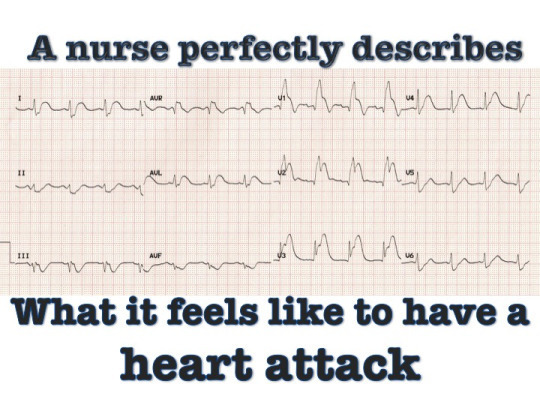
I am an ER nurse and this is the best description of this event that I have ever heard.
FEMALE HEART ATTACKS
I was aware that female heart attacks are different, but this is description is so incredibly visceral that I feel like I have an entire new understanding of what it feels like to be living the symptoms on the inside. Women rarely have the same dramatic symptoms that men have… you know, the sudden stabbing pain in the chest, the cold sweat, grabbing the chest & dropping to the floor the we see in movies. Here is the story of one woman’s experience with a heart attack:
"I had a heart attack at about 10:30 PM with NO prior exertion, NO prior emotional trauma that one would suspect might have brought it on. I was sitting all snugly & warm on a cold evening, with my purring cat in my lap, reading an interesting story my friend had sent me, and actually thinking, ‘A-A-h, this is the life, all cozy and warm in my soft, cushy Lazy Boy with my feet propped up. A moment later, I felt that awful sensation of indigestion, when you’ve been in a hurry and grabbed a bite of sandwich and washed it down with a dash of water, and that hurried bite seems to feel like you’ve swallowed a golf ball going down the esophagus in slow motion and it is most uncomfortable. You realize you shouldn’t have gulped it down so fast and needed to chew it more thoroughly and this time drink a glass of water to hasten its progress down to the stomach. This was my initial sensation–the only trouble was that I hadn’t taken a bite of anything since about 5:00 p.m.
After it seemed to subside, the next sensation was like little squeezing motions that seemed to be racing up my SPINE (hind-sight, it was probably my aorta spasms), gaining speed as they continued racing up and under my sternum (breast bone, where one presses rhythmically when administering CPR). This fascinating process continued on into my throat and branched out into both jaws. ‘AHA!! NOW I stopped puzzling about what was happening – we all have read and/or heard about pain in the jaws being one of the signals of an MI happening, haven’t we? I said aloud to myself and the cat, Dear God, I think I’m having a heart attack! I lowered the foot rest dumping the cat from my lap, started to take a step and fell on the floor instead. I thought to myself, If this is a heart attack, I shouldn’t be walking into the next room where the phone is or anywhere else… but, on the other hand, if I don’t, nobody will know that I need help, and if I wait any longer I may not be able to get up in a moment.
I pulled myself up with the arms of the chair, walked slowly into the next room and dialed the Paramedics… I told her I thought I was having a heart attack due to the pressure building under the sternum and radiating into my jaws. I didn’t feel hysterical or afraid, just stating the facts. She said she was sending the Paramedics over immediately, asked if the front door was near to me, and if so, to un-bolt the door and then lie down on the floor where they could see me when they came in. I unlocked the door and then laid down on the floor as instructed and lost consciousness, as I don’t remember the medics coming in, their examination, lifting me onto a gurney or getting me into their ambulance, or hearing the call they made to St. Jude ER on the way, but I did briefly awaken when we arrived and saw that the radiologist was already there in his surgical blues and cap, helping the medics pull my stretcher out of the ambulance. He was bending over me asking questions (probably something like ‘Have you taken any medications?’) but I couldn’t make my mind interpret what he was saying, or form an answer, and nodded off again, not waking up until the Cardiologist and partner had already threaded the teeny angiogram balloon up my femoral artery into the aorta and into my heart where they installed 2 side by side stints to hold open my right coronary artery.
I know it sounds like all my thinking and actions at home must have taken at least 20-30 minutes before calling the paramedics, but actually it took perhaps 4-5 minutes before the call, and both the fire station and St Jude are only minutes away from my home, and my Cardiologist was already to go to the OR in his scrubs and get going on restarting my heart (which had stopped somewhere between my arrival and the procedure) and installing the stents. Why have I written all of this to you with so much detail? Because I want all of you who are so important in my life to know what I learned first hand.
1. Be aware that something very different is happening in your body, not the usual men’s symptoms but inexplicable things happening (until my sternum and jaws got into the act). It is said that many more women than men die of their first (and last) MI because they didn’t know they were having one and commonly mistake it as indigestion, take some Maalox or other anti-heartburn preparation and go to bed, hoping they’ll feel better in the morning when they wake up… which doesn’t happen. My female friends, your symptoms might not be exactly like mine, so I advise you to call the Paramedics if ANYTHING is unpleasantly happening that you’ve not felt before. It is better to have a ‘false alarm’ visitation than to risk your life guessing what it might be!
2. Note that I said ‘Call the Paramedics.’ And if you can take an aspirin. Ladies, TIME IS OF THE ESSENCE! Do NOT try to drive yourself to the ER - you are a hazard to others on the road. Do NOT have your panicked husband who will be speeding and looking anxiously at what’s happening with you instead of the road. Do NOT call your doctor – he doesn’t know where you live and if it’s at night you won’t reach him anyway, and if it’s daytime, his assistants (or answering service) will tell you to call the Paramedics. He doesn’t carry the equipment in his car that you need to be saved! The Paramedics do, principally OXYGEN that you need ASAP. Your Dr. will be notified later.
3. Don’t assume it couldn’t be a heart attack because you have a normal cholesterol count. Research has discovered that a cholesterol elevated reading is rarely the cause of an MI (unless it’s unbelievably high and/or accompanied by high blood pressure). MIs are usually caused by long-term stress and inflammation in the body, which dumps all sorts of deadly hormones into your system to sludge things up in there. Pain in the jaw can wake you from a sound sleep. Let’s be careful and be aware. The more we know the better chance we could survive to tell the tale.“
Reblog, repost, Facebook, tweet, pin, email, morse code, fucking carrier pigeon this to save a life!
I wish I knew who the author was. I’m definitely not the OP, actually think it might be an old chain email or even letter from back in the day. The version I saw floating around Facebook ended with “my cardiologist says mail this to 10 friends, maybe you’ll save one!” And knew this was way too interesting not to pass on.
271K notes
·
View notes
Text
COLD WEATHER TIPS FROM SOMEONE WHO LIVES WHERE IT’S COLD:
I always see posts about layering clothing, but there are so many more creative ways to help keep you warm if you don’t have a lot of warm clothes. But first, a note on layering clothing:
-Your underlayer is your WICKING layer. That means it is a layer specifically to absorb the moisture your body produces. DO NOT USE COTTON AS A BOTTOM LAYER. Use merino wool if possible, but other good substitutions are nylon, polyester and rayon.
-Your middle layer is for insulation. You want AIR POCKETS in there, NOT tight fitting clothes. This is where you want to put your fluffy sweaters, your fleece, down, fur, flannel, or vests. If you do not have these, you can substitute with multiple layers of long sleeve shirts.
-Your outer layer is for keeping the cold away from your body. If you do not have a jacket, you can put on your thickest piece of clothing and then a raincoat over it. Windbreaker if you have one.
ALSO
-Jeans are the absolute worst at holding heat. Use only as a last resort.
-You can’t really ever have too many layers on your feet. Alternate tucking your layers of pants into your layers of socks to keep your ankles warm!
-Wear a hat OVER a hood if it will fit! This will keep your ears warmest.
TAKE OFF/OUT ANY AND ALL JEWELERY/PIERCINGS
-If you have a medical bracelet, DO NOT REMOVE IT. If you can, tuck a layer of clothes between it and your skin.
NON-CLOTHING TIPS:
-Raid your recycling. Gather all cardboard boxes and break them down so that they are flat. Put them on the floor to add more layers between you and the cooling house. Newspaper will also serve the same purpose.
-In an emergency, you can also layer newspaper between clothing layers. Don’t worry about looking stupid if you’re staying warm.
-If you have a tent, set that sucker up in whatever room you have decided to stay in. Stay in it and keep it zipped shut as much as you can, but do NOT cover the vent at the top. You can put the rain fly up, but make sure there is circulating air for you to breathe.
-You are probably not going to feel very hungry at times. DO NOT STOP EATING OR DRINKING. Digestion produces a lot of body heat and the food will give your body energy to keep itself going.
-The best foods are heavy and full of carbs and proteins. Eat nuts, eggs, pasta, meats, and beans. If you are on a diet, now you’re not. If you’re vegetarian… bulk up on those pastas and nuts.
-Try not to sweat. If you are finding yourself getting damp, take off the outer layer just until you start to cool slightly. Then redress! Your bottom layer should dry quickly, and being wet is dangerous.
-On that note, STAY ACTIVE. You are probably going to want to hunker down and snuggle up, but that will make your muscles cramp. Every 15-20 minutes do something that gets you up and about. Walk circles in the room, do a couple jumping jacks, stretch, whatever. Just enough to move some blood around your body. Don’t get sweaty or out of breath, it’s just a little movement.
-CHAPSTICK. ON YOUR LIPS. ON YOUR NOSE. ON YOUR EARS. ON YOUR KNUCKLES. Don’t let your extremities get dry or cracked.
SIGNS OF HYPOTHERMIA:
-Uncontrollable shivering
-Slurred speech
-Confusion or memory loss
-Dizziness or lack of coordination
-Inability to be woken from sleep
CHILDREN AND INFANTS!!!! I CANNOT STRESS THIS ENOUGH.
-Children WILL get colder before you. Make sure they are properly bundled up.
-If you need to breastfeed, put a blanket over the both of you and wait a few minutes for the air to warm before removing or shifting your clothing.
-DO NOT COVER AN INFANTS FACE. ESPECIALLY WHEN SLEEPING. Keep them tucked inside your own clothes when possible. As close to your heart and stomach as possible.
-Put chapstick on children’s cheeks and clean their face often if they are crying or wiping at their nose. This will prevent cracked skin and irritation.
-Make sure your children are staying as hydrated as you! They are going to fuss and not want to drink cold things, but they NEED liquids.
SIGNS OF HYPOTHERMIA IN INFANTS AND TODDLERS ARE DIFFERENT:
-Shortness of breath
-Cold, red skin
-Lethargy or listlessness
Finally:
CHECK ON YOUR NEIGHBORS. CHECK ON CHILDREN. CHECK ON THE ELDERLY. STAY SNUGGLED. STAY SAFE.
70K notes
·
View notes
Text
So let me get this straight, in Monopoly if you give one player more money to start out it’s “unfair” but if you do it in real life it’s “capitalism”?
189K notes
·
View notes
Text
Skip Google for Research
As Google has worked to overtake the internet, its search algorithm has not just gotten worse. It has been designed to prioritize advertisers and popular pages often times excluding pages and content that better matches your search terms
As a writer in need of information for my stories, I find this unacceptable. As a proponent of availability of information so the populace can actually educate itself, it is unforgivable.
Below is a concise list of useful research sites compiled by Edward Clark over on Facebook. I was familiar with some, but not all of these.
⁂
Google is so powerful that it “hides” other search systems from us. We just don’t know the existence of most of them. Meanwhile, there are still a huge number of excellent searchers in the world who specialize in books, science, other smart information. Keep a list of sites you never heard of.
www.refseek.com - Academic Resource Search. More than a billion sources: encyclopedia, monographies, magazines.
www.worldcat.org - a search for the contents of 20 thousand worldwide libraries. Find out where lies the nearest rare book you need.
https://link.springer.com - access to more than 10 million scientific documents: books, articles, research protocols.
www.bioline.org.br is a library of scientific bioscience journals published in developing countries.
http://repec.org - volunteers from 102 countries have collected almost 4 million publications on economics and related science.
www.science.gov is an American state search engine on 2200+ scientific sites. More than 200 million articles are indexed.
www.pdfdrive.com is the largest website for free download of books in PDF format. Claiming over 225 million names.
www.base-search.net is one of the most powerful researches on academic studies texts. More than 100 million scientific documents, 70% of them are free
215K notes
·
View notes
Text
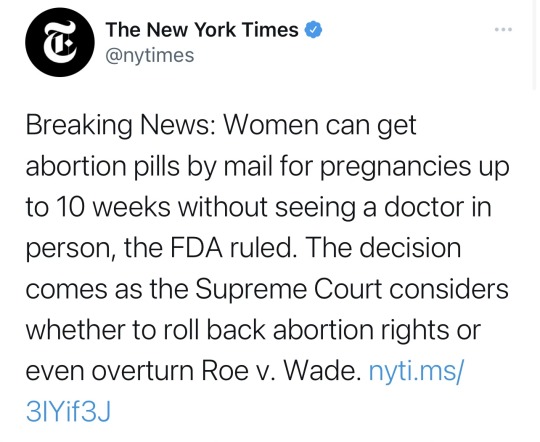
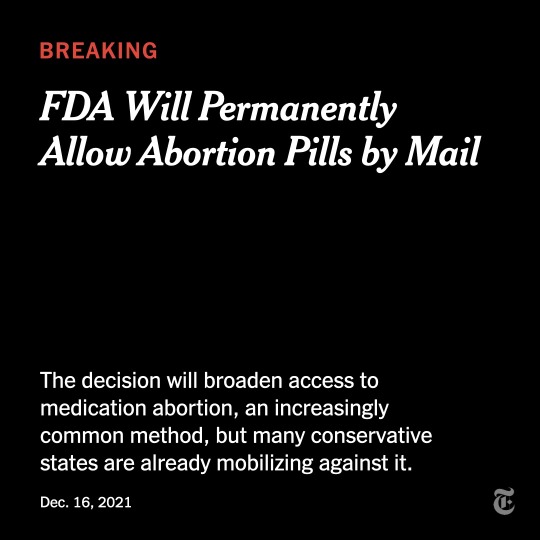
Finally, some good news.
👉🏿 https://www.nytimes.com/2021/12/16/health/abortion-pills-fda.html
129K notes
·
View notes
Note
Hey! Are there any plants you can recommend for an apartment garden intended to produce food? This is my first apartment after living in the country my whole life, and food is very expensive, so I want to plant a little pot garden, but I'd love some suggestions on what to put in it because I have no experience for growing in such limited space. What do you think would be best for producing food, but also looking nice and not needing much space?
Plants that you can grow in a pot that will produce a lot of filler-food really fast (like, you can start harvesting within 2-3 weeks of sprouting [though I'd really reccomend starts/baby plants and not seeds this late in summer]):
Lettuce, kale, swiss chard, brocolini, broccoli, PEAS, Green Beans, radishes, zucchini and other summer squash. Use these to fill in meals/stretch out protiens/feel fuller/get more fiber in your diet. Not a lot of calories but the fiber and vitamins they have are good for you.
Plants you can grow in a pot that will produce a lot of flavors for you: Basil, thyme, rosemary, Parsley, sage, oregano, mint, marojam, bay laurel, and Dill. Nearly every fresh herb can be grown in a pot and while they don't make a lot of filler or calories, they do make what food you have taste a whole lot better.
Plants you can grow in a pot that take a lot longer to mature but will produce a TON of food all at once that can be frozen for later: Patio Tomatoes, winter squash, strawberries, carrots, POTATOES, garlic, onions, beets, beans you dry out for later like pinto and black beans. This will require storage space in your freezer or a cool dark place like a closet.
Not a Plant, but you can get grow kits and get a shitload of them really fast and grow them indoors: Mushrooms. Those mushroom kits WORK and will keep producing for a suprisngly long time.
CAVEATS:
I think all plants are pretty but I can't speak to what your apartment complex will or will not allow.
I also find tending the garden very relaxing so I think all plants are low-effort so don't take my word on what a normal amount of work is.
A lot of what you CAN grow will depend on how much sunlight and space you have, and how much soil you're willing/able to schlep up there, so you'd have to send me more precise specs on your space to get specific advice on what to plant, but think about
A) what you'll actually eat
B) look up the sunlight and space requirements of those crops
C) look into as many vertical growing options as possible tbh. Peas will grow on any trellis even just some sticks or string, herbs can be wall-mounted, and other plants can pe put in pots on risers to get as many plants into the sunlight you have.
If food stability is a concern for you PLEASE look up the location, hours and requirements of your local food bank. It's there for everyone who needs it, including you.
You can also see if your city has a crop share program where you can get produce from local/nearby farmers at a big discount compared to the store. goo for you, your wallet AND the enviornment.
2K notes
·
View notes
Text
An incomplete list of things that employers commonly threaten that are 100% illegal in the United States
"We'll fire you if you tell others how much you're making" The National Labor Relations Act of 1935 specifically protects employees who discuss their own wages with each other (you can't reveal someone else's wages if you were given that information in the course of work, but you can always discuss your own or any that were revealed to you outside of work duties)
"If we can't fire you for [discussing wages/seeking reasonable accommodation/filing a discrimination complaint/etc], we'll just fire you for something else the next day." This is called pretextual termination, and it offers your employer almost no protection; if you are terminated shortly after taking a protected action such as wage discussion, complaints to regulatory agencies, or seeking a reasonable accommodation, you can force the burden onto your employer to prove that the termination wasn't retaliatory.
"Disparaging the company on social media is grounds for termination" Your right to discuss workplace conditions, compensation, and collective action carries over to online spaces, even public ones. If your employer says you aren't allowed to disparage the company online or discuss it at all, their social media policy is illegal. However, they can forbid releasing information that they're obligated to keep confidential such as personnel records, business plans, and customer information, so exercise care.
"If you unionize, we'll just shut this branch down and lay everyone off" Threatening to take action against a group that unionizes is illegal, full stop. If a company were to actually shut down a branch for unionizing, they would be fined very heavily by the NLRB and be opening themselves up to a class-action lawsuit by the former employees.
"We can have any rule we want, it's only illegal if we actually enforce it" Any workplace policy or rule that has a "chilling effect" on employees' willingness to exercise their rights is illegal, even if the employer never follows through on any of their threats.
"If you [protected action], we'll make sure you never work in this industry/city/etc again." Blacklisting of any kind is illegal in half the states in the US, and deliberately sabotaging someone's job search in retaliation for a protected action is illegal everywhere in the US.
"Step out of line and you can kiss your retirement fund/last paycheck goodbye." Your employer can never refuse to give you your paycheck, even if you've been fired. Nor can they keep money that you invested in a retirement savings account, and they can only claw back the money they invested in the retirement account under very specific circumstances.
"We'll deny that you ever worked here" not actually possible unless they haven't been paying their share of employment taxes or forwarding your withheld tax to the government (in which case they're guilty of far more serious crimes, and you might stand to gain something by turning them in to the IRS.) The records of your employment exist in state and federal tax data, and short of a heist that would put Oceans 11 to shame, there's nothing they can do about that.
94K notes
·
View notes
Text
Losing my mind remembering that pic chelsea manning posted of the extremely undercover and not at all obvious fbi agent who was tailing her after her release
250K notes
·
View notes
Photo
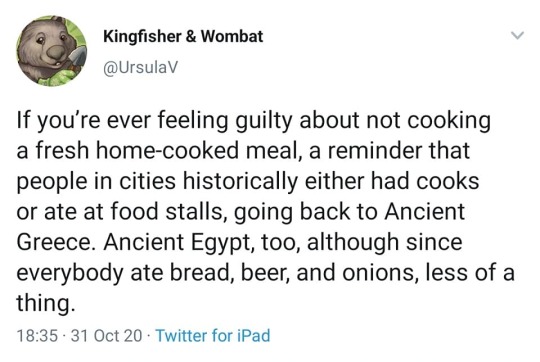
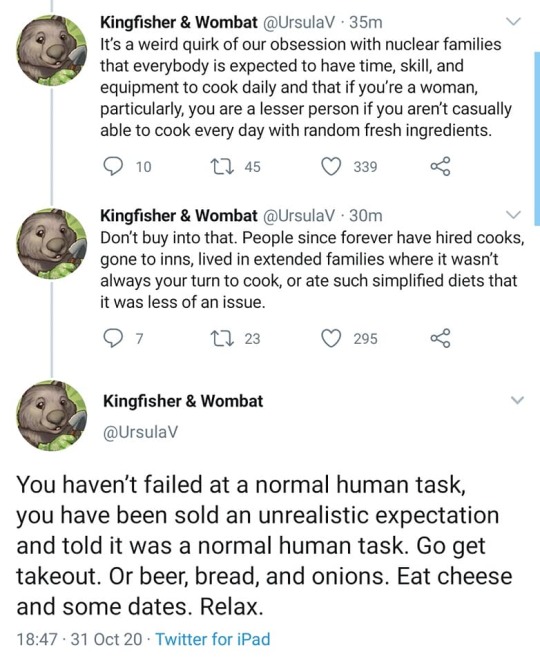
For those who have overactive guilt complexes like me…
160K notes
·
View notes
Photo

stupid leftists and their belief in *checks notes* the intrinsic value of human life
310K notes
·
View notes
Text
Hedge funds shorted more than 100% of all shares of gamestop, to do this that means they had to sell more shares than actually existed.
The hedge funds never actually owned these shares to begin with because they were short selling so they never actually paid for them.
Redditors saw this and decided to buy up all these shorted shares to gamestop a company that wasnt failing that the hedge funds would then be forced to buy back as they never actually owned the shares.
The beauty of this is if you knew what to look for you could’ve seen this coming too. It isn’t mystical, it isn’t magic. They made these billionaires pay back more than what they basically stole by being greedy, this is a good thing.
93K notes
·
View notes


